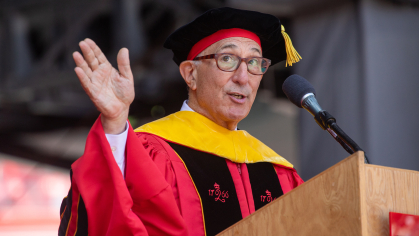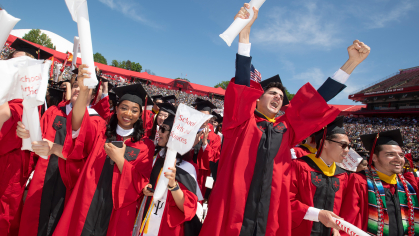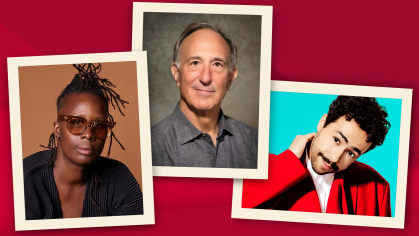Life-Threatening Heart Inflammation Sparks a Passion for Biomedical Engineering
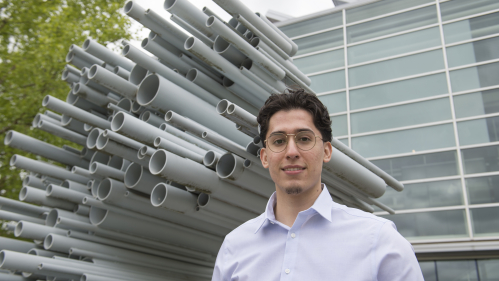
Rutgers School of Engineering (SOE) biomedical engineering graduate Joseph Salguero was not planning to go to college until he faced a battle with myocarditis, a life-threatening inflammation of the heart muscle in 2017.
It is a time he will never forget.
Salguero was working at his part-time job when he felt a sharp pain in his arm. “I figured it was because I didn’t eat or lacked sleep,” said Salguero who ultimately went to the emergency department. “I went home to sleep it off and the pain became progressively worse."
Once admitted to the hospital, Salguero spent several weeks during the beginning of his senior year at North Plainfield High School in the Robert Wood Johnson ICU, undergoing corticosteroid therapy and monitoring the progress of his condition, which is responsible for up to 20 percent of sudden death cases in young adults, according to the Myocarditis Foundation.
But Salguero says his life was saved in more ways than one by a physician treating him in the ICU for his unexpected illness. Although he was always good at math, he was interested in the latest new technology and spent a lot of time playing video games – and he never thought his interests could lead to a career.
Engineering was never on his radar.
“Everyday my doctor would come in to check my ultrasounds and EKGs, and as he learned more about my interests and personality he started to advocate that I look into the different disciplines of engineering since he felt it would be a good fit for me,” said Salguero. “I was on bed rest my entire time in the ICU so I had a lot of time on my hands. That’s when I came to the realization that biomedical engineering is the community I wanted to involve myself with.”
So instead of worrying about his health, Salguero learned about the machinery keeping him alive – the EKGs, ultrasounds and catheters created by biomedical engineers that have the potential to extend and improve the quality of life for countless numbers of patients.
When he left the hospital, Salguero, who had spent time working out to keep physically fit before he got sick, was told to refrain from any physical activity for 6-8 months while he continued physical therapy with his cardiology team.
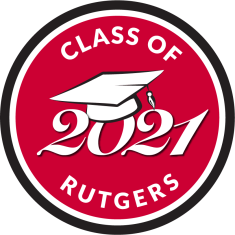
It was during this time that Salguero, a first-generation student whose mother came from Ecuador, met with the SOE Educational Opportunity Fund (EOF) program – a state-supported program that gives academically and economically disadvantaged students access to higher education who helped lay the groundwork for his subsequent success as a biomedical engineering student.
The EOF program connected Salguero with other students and faculty – bringing together people from various backgrounds with different stories to tell but with the same goal of attaining a degree for a better cause.
“While I was extremely motivated and ready to hit the ground running, EOF quickly humbled me since I lacked the skill set and study habits to be a successful student,” he says.
Gaining the framework he needed to begin his engineering studies was like learning a new language. Besides learning how to code – necessary because engineering development and software technology are indispensable – Salguero needed to learn more self-discipline, better study skills and how to build more confidence in his own academic abilities.
“There were times I felt like the material might not ever click with me,” he said. “My head would just overwhelmingly fill with negative thoughts and doubts. That’s when I had to lean on the professional and academic staff of the program for guidance and help.”
But within five weeks of starting the program, Salguero said he felt that EOF had given the tools and resources needed to start his academic career. “If it were not for SOE/EOF, I truly would not be where I am today.”
Biomedical engineering assistant professor Kristen Labazzo first met Salguero when he registered for her summer biomaterials class. “Given his industry interests, as a senior, Joseph took my graduate class focused on the medical device industry, in which he’s done very well,” she said.
During his time at Rutgers, Salguero completed two design engineering co-op rotations with Ethicon, a Johnson & Johnson medical device company. He led the early-stage development of surgical device technologies involving computer automated design work, design of experiments (DOE), as well as statistical and computational analyses and returned to continue his work in the summer of 2020.
For his senior design project he and his team worked to create a computational model showing the final location of a noncancerous skin growth behind the middle ear, which will give ear, nose and throat specialists and patients a visual of the disease’s progression.
“Having to collaborate through an entirely virtual platform became difficult,” he said. “Technical limitations often hindered the speed of the project progression – but it never put us to a stop.”
Salguero likes sharing what he learned with students entering SOE, through the Minority Engineering Educational Task (MEET), the SOE Peer Mentor Program, and the EOFSI Program.
His advice: “Don’t fear failure. Failure can be utilized as a catalyst to your academic and personal growth,” he insists. “Learn to accept failure and how to move through it efficiently. If one approach doesn’t work, adapt and switch up your strategy so that you won’t fail the same way twice. This approach has helped me countless times during my time at the School of Engineering.”
Salguero’s perseverance has resulted in a job offer with Merck, where he will be working in their three-year Early Talent Rotational Program in different areas of engineering and procurement during year-long rotations.
His success, he says, is also a tribute to the countless sacrifices made by his mother. “It’s also served as an example that has motivated my family to never lose touch of our work ethic and the drive that we all share and that has brought us this far.
